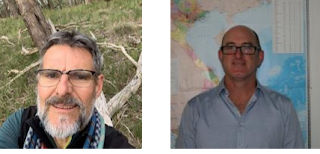 |
| Peter Sale discussing soil fertility issues in the Central Dry Zone of Myanmar | Photo courtesy of the author |
It has been a busy time for our research team during these last few weeks, as we launched our crowd funding campaign on Wednesday 20 May. The campaign aimed to raise $3,500 for a project in the Central Dry Zone (CDZ) of Myanmar, where we will try to improve degraded wasteland soils so that small-holder farmers can use them again for growing food crops.
The funds will purchase and modify a single-tine ripper in Geelong, then ship it up to Myanmar for use in the project.
Next year, when COVID-19 is hopefully behind us, a member of our team will travel to the CDZ and set up two small pilot trials to test best-bet interventions for improving these soils. They will most likely involve ripping the compacted soils and adding manure and fertiliser deep into the rip-lines, and then grow a crop of sorghum during the monsoon rainy season. This approach has worked for us here in Victoria, and we want to see if it will work for the CDZ farmers.
 |
| A wasteland soil in the Central Dry Zone in Myanmar | Photo courtesy of the author |
The reason we chose crowdfunding for this project is that it's very difficult to acquire research funds for this type of project. Our government has been cutting back in providing funds for international agricultural development, and it is difficult to know which philanthropic organisation to approach. The total money required is relatively small, and the humanitarian nature of this project has appeal. We thought the project lent itself to crowdfunding - here's the "Deep roots in Myanmar" campaign site at Pozible.
The campaign has been surprisingly successful in that the target was reached on Friday 22 May morning, just two days after the launch!
 |
| Robert Edis (RIGHT) talking with farmer in the CDZ | Photo courtesy of the author |
Well, the issue for busy academics is that crowdfunding does take quite a lot of time and effort. A solo academic, inexperienced in crowdfunding, would find it very difficult to mount a major campaign. Fortunately, our team had four members working on the project, and strategic advice from Jonathan O'Donnell (who is doing his PhD on research crowdfunding).
Two essential tasks for our crowdfunding project were:
- Building the website on the Pozible platform, and
- Spreading the word among potential supporters. I found this difficult and was taken to the edge of my comfort zone in asking potential supporters for a donation.
We reach our campaign target – what then?
We will need additional funds in 2021 and plan to run a larger campaign to fund the second site at Thangtha in the dry zone with a funding target of around $7,000.
Why do we do this type of research?
Most researchers would like their research to have a beneficial impact on people in need. This applies to this project and, in this respect, we identify with the words of La Trobe's founding Vice-Chancellor, the late David Myers: “The true measure of a university’s greatness is the total effect it has on human welfare and progress”.
Another source of motivation lies with the science. We want to see if these interventions improve crop productivity and sustainability on these wasteland soils; if it does, then why?
---------------------------------------------------
Peter Sale (LEFT), who authored this post, is a staff member at La Trobe from 1988-2018. His research interests in his later years were in subsoil amelioration, and he made trips to Myanmar in 2015 and 2018 where he focussed on ways to improve wasteland soils in the dry zone.
The project leader is Gary Clark from the Animal Plant and Soil Sciences Department in the School of Life Sciences. Gary lectures in soil science at La Trobe; he was awarded his PhD in subsoil amelioration in 2009.
Robert Edis is a team member who recently retired from managing agricultural research programs in soils/agronomy with the Australian Centre for International Agricultural Research.
Thander Nyi is a team member and a Soil Scientist (and Chair the ASEAN Regional Soil and Nutrient Management Expert Group) - Land Use Division, Myanmar.
 |
| Project leader Gary Clark (LEFT) and team member Robert Edis | Photos courtesy of the author |
 |
| Project team member Thander Nyi | Photo courtesy of the author |

Comments